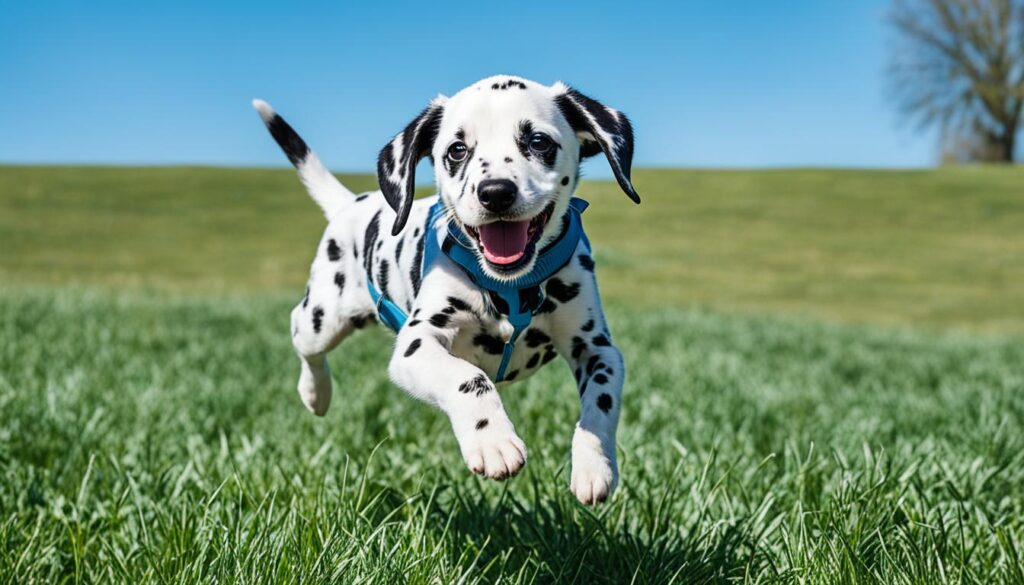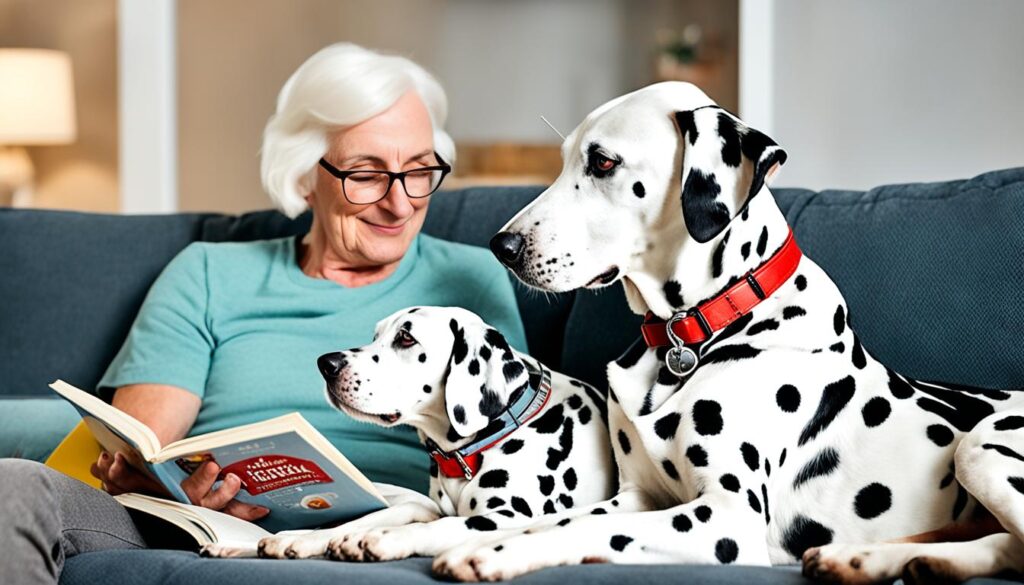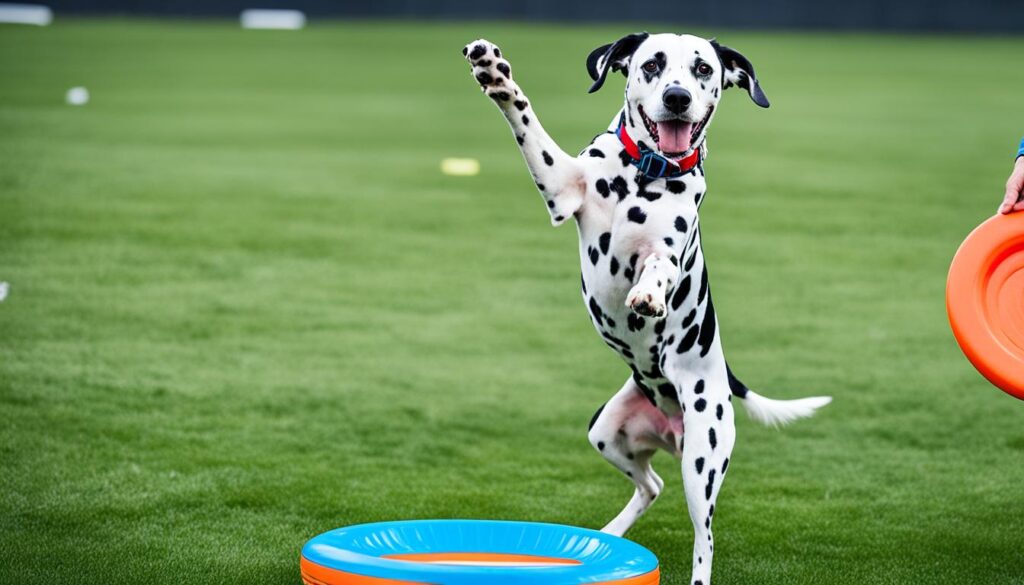Dalmatians are a fascinating breed with a rich history and unique characteristics. Did you know that Dalmatians were originally used as carriage dogs in 17th century England? Their association with carriages eventually led to their role as symbols for firefighters.
These energetic and athletic dogs are instantly recognizable with their white coats and black spots. But there is so much more to love about Dalmatians than just their distinctive appearance.
In this comprehensive guide, we will delve into the fascinating history of Dalmatians, explore their physical characteristics, delve into their energetic nature, discuss training methods and temperament, and provide essential tips for their care. Whether you’re considering adding a Dalmatian to your family or simply want to learn more about this beloved breed, get ready to discover 101 reasons to love Dalmatians.
Key Takeaways:
- Dalmatians have a rich history as carriage dogs and symbols for firefighters.
- They are known for their distinctive white coats with black spots.
- Dalmatians are energetic and athletic, requiring regular exercise and mental stimulation.
- Training Dalmatians requires gentle and positive reinforcement techniques.
- Proper socialization is essential to develop their friendly and outgoing temperament.
The History of Dalmatians
Throughout history, Dalmatians have made their mark as an ancient breed with a diverse and fascinating background. These distinctive dogs have been spotted in various roles, intertwining with human history dating back to ancient times.
In 17th century England, Dalmatians found their calling as carriage dogs. They were tasked with keeping pace alongside horses, providing protection and assistance during the carriage rides. Their agility, endurance, and striking appearance made them ideal for this role, earning them the status of esteemed companions.
However, it was the association with firefighters that truly set Dalmatians apart. Their unique bond with fire brigades became legendary. With their natural affinity for horses, Dalmatians were often seen guiding the fire wagons, clearing the way, and safeguarding the equipment during emergency situations. They quickly became indispensable additions to firefighting teams, adored for their loyalty and dedication.
| Roles | Time Period |
|---|---|
| Carriage Dogs | 17th century England |
| Symbols for Firefighters | Ongoing |
Even today, Dalmatians symbolize the bravery and heroism of firefighters. Their iconic presence at fire stations and parades serves as a reminder of the special bond shared between these magnificent dogs and the brave men and women who dedicate their lives to protecting others.
In the next section, we will explore the physical characteristics of Dalmatians and what makes them truly stand out.
Physical Characteristics of Dalmatians
Dalmatians are known for their unique and eye-catching appearance. Their close, sleek coats are predominantly white, adorned with distinctive black spots. This iconic coat sets them apart from other breeds, making them easily recognizable. Dalmatians have a medium-sized build, with males typically weighing between 45 to 70 pounds and standing 19 to 24 inches tall at the shoulder. Females usually have similar measurements, albeit slightly smaller.
Dalmatians are not bulky dogs but are rather sleek and athletic in their physique. Their compact yet muscular bodies allow them to move with grace and agility. Their weight and height range is typically within the medium size category for dogs, making them suitable for a variety of living environments.
When it comes to lifespan, Dalmatians typically live between 11 to 13 years. However, it’s worth noting that individual health and care factors can influence their longevity.
Physical Characteristics Overview:
- Coat: Close, sleek, and predominantly white with black spots
- Weight Range: 45 to 70 pounds
- Height Range: 19 to 24 inches (at the shoulder)
- Life Expectancy: 11 to 13 years
The Energetic Nature of Dalmatians
Dalmatians are known for their energetic nature, which can be attributed to their history as working dogs. They have retained their high levels of physical and mental energy, making them a breed that requires regular exercise and stimulation.
Daily exercise is essential for Dalmatians to release their energy and maintain a healthy and balanced temperament. Without adequate exercise, they may act out and exhibit behavioral problems. It’s important for Dalmatian owners to prioritize their exercise needs to ensure their overall well-being.
In addition to regular exercise, playtime is another crucial aspect of meeting a Dalmatian’s needs. Engaging in interactive play sessions helps stimulate them mentally and allows them to channel their energy in a positive way.
Here are some ways to provide exercise and playtime for your Dalmatian:
- Take daily walks or jogs: Dalmatians have a lot of physical energy and require regular outdoor exercise to keep them physically fit. Long walks or jogs can help burn off excess energy and prevent them from becoming restless.
- Engage in interactive play: Dalmatians are intelligent dogs that enjoy mentally stimulating activities. Playing fetch, hide-and-seek, or providing puzzle toys can keep them mentally engaged and entertained.
- Consider agility training: Dalmatians are highly athletic and enjoy participating in agility courses. This type of training provides both physical exercise and mental stimulation, allowing them to showcase their natural abilities.
It’s important to note that Dalmatians may have different exercise requirements based on their age, health, and individual energy levels. Consulting with a veterinarian can help you develop a suitable exercise routine for your Dalmatian.
By providing adequate exercise and playtime, you can help your Dalmatian lead a fulfilling and balanced lifestyle, keeping their physical and mental energy in check.
Recommended Exercise for Dalmatians
| Exercise Type | Frequency | Duration |
|---|---|---|
| Daily Walks | At least once a day | 30 minutes to 1 hour |
| Jogs or Runs | 2-3 times a week | 20-30 minutes |
| Interactive Play | Daily | 15-30 minutes |
| Agility Training | 1-2 times a week | 20-30 minutes |
It’s important to gradually increase the intensity and duration of exercise as your Dalmatian builds stamina. Monitoring their response to exercise and providing breaks when needed is also essential to prevent overexertion.
Training Dalmatians
Dalmatians are known for their high intelligence, making them excellent candidates for training. Early training is essential to establish good behaviors and prevent any potential issues that may arise from their independent streak. Gentle and positive reinforcement methods are most effective when training Dalmatians, as they respond well to this approach. By using gentle training methods, Dalmatians are motivated to please their owners and quickly learn commands and desired behaviors.
Establishing Rules and Boundaries
When training Dalmatians, it’s important to establish clear rules and boundaries from the beginning. This helps them understand what behaviors are acceptable and what are not. Consistency in training is key, as Dalmatians thrive in an environment with clear expectations. By providing consistent guidance, they can develop into well-mannered and obedient dogs.
The Power of Positive Reinforcement
Dalmatians respond best to positive reinforcement training techniques. This involves rewarding desired behaviors with treats, praise, or playtime. By focusing on positive reinforcement, owners can build trust and strengthen the bond with their Dalmatians. Harsh training methods or punishment should be avoided, as they can hinder the training process and potentially damage the relationship between the owner and dog.
Early Training and Socialization
Early training and socialization are crucial for Dalmatians. Starting training from a young age helps them develop good habits and behaviors early on. Socialization is also important, as it exposes them to different people, animals, and environments, helping them become well-adjusted and confident dogs. By exposing them to various experiences, Dalmatians are more likely to be comfortable and adaptable in different situations.
Training Dalmatians requires patience, consistency, and a gentle approach. Their intelligence and eagerness to please make them quick learners. By using positive reinforcement techniques and establishing clear rules and boundaries, Dalmatians can become well-behaved and obedient companions.
Dalmatian Temperament and Social Needs
Dalmatians are renowned for their loyalty, making them exceptional companions for individuals and families alike. These dogs have high social needs and thrive on human companionship, seeking constant interaction and bonding opportunities. To ensure their well-rounded development, early socialization is crucial for Dalmatians, enabling them to adapt well to various environments, people, and animals.
One remarkable aspect of Dalmatians is their ability to form strong bonds with their human family members, particularly children. The unique connection between Dalmatians and children is fostered by their gentle and protective nature. Dalmatians often become a child’s steadfast friend, providing unwavering loyalty and companionship throughout their formative years.
To fully meet their social needs, Dalmatians require ample socialization and exposure to different stimuli from a young age. Positive experiences with strangers, animals, and varying environments help Dalmatians develop into well-adjusted and confident dogs.
Benefits of Early Socialization:
- Enhances adaptability to new situations and people
- Promotes positive interactions with other animals
- Reduces the likelihood of fear-based aggression
- Encourages a calm and balanced temperament
Creating a Strong Bond with Children:
Dalmatians have a natural affinity for children and exhibit a gentle and protective nature in their presence. This bond between Dalmatians and children can lead to amazing benefits, including:
- Emotional support and companionship
- Fostering a sense of responsibility and empathy in children
- Encouraging active play and physical exercise
Meeting Dalmatian’s Social Needs:
Providing Dalmatians with adequate socialization and companionship is essential to their overall well-being. It is recommended to:
- Expose them to various environments, people, and animals from a young age
- Regularly engage them in interactive play and quality time
- Join socialization classes or group activities
- Seek professional guidance for proper socialization techniques
Dalmatian Temperament Summary:
| Trait | Description |
|---|---|
| Loyal | Dalmatians are fiercely devoted to their owners, forming strong bonds. |
| Playful | They have an energy and zest for life, making playtime essential. |
| Social | Dalmatians thrive on human companionship and enjoy being included in family activities. |
| Protective | This breed exhibits a natural protective instinct towards loved ones, especially children. |
Dalmatian Health Concerns

When it comes to the health of Dalmatians, there are a few potential concerns to keep in mind. While they are generally healthy dogs, there are some hereditary conditions that are more common in this breed. It’s important to be aware of these health issues to ensure the well-being of your Dalmatian companion.
Hereditary Deafness
Approximately 8% of Dalmatians are born deaf, and an additional 22% suffer from partial deafness. This hereditary condition can affect one or both ears and is more prevalent in the breed compared to other dog breeds. Early detection through hearing tests and management strategies can help ensure that affected Dalmatians have a safe and fulfilling life.
Skin Allergies
Dalmatians are also prone to skin allergies, which can be caused by various factors such as food ingredients, environmental allergens, or contact irritants. These allergies can result in skin inflammation, itching, and discomfort. Identifying the triggers and working closely with a veterinarian to develop a suitable management plan can help keep your Dalmatian’s skin healthy and free from irritation.
Urolithiasis (Urinary Tract Stones)
Dalmatians have a unique urinary tract system that puts them at a higher risk of developing urolithiasis, or urinary tract stones. These stones can cause discomfort, pain, and urinary issues. Maintaining proper hydration and providing a balanced diet that reduces the risk of stone formation are essential preventative measures. Regular vet check-ups, including urinary screenings, can help monitor your Dalmatian’s urinary health and catch any potential issues early on.
Being aware of these health concerns and taking proactive measures can greatly contribute to the overall well-being of your Dalmatian. Regular vet check-ups, a balanced diet, proper hydration, and attentive care are key to ensuring a healthy and happy life for your furry friend.
Grooming Needs of Dalmatians
When it comes to grooming, Dalmatians are fairly low-maintenance. They have a short coat that requires minimal attention. Unlike some other breeds, Dalmatians do not have a strong dog odor, making them a great choice for those who prefer a cleaner-smelling pet.
Bathing should be done every few weeks or as needed when they get dirty. This ensures that their coat stays clean and healthy without overwashing, which can strip the natural oils from their skin.
Regular Brushing and Shedding
Regular brushing is important to keep your Dalmatian’s coat looking its best. Not only does it help remove loose hair, but it also stimulates the skin and promotes good blood circulation.
While Dalmatians have short hair, they do shed throughout the year. Regular brushing helps manage the shedding by removing loose hairs before they end up on your clothes and furniture. It also helps prevent tangling and matting, which can be uncomfortable for your furry friend.
Grooming Supplies for Dalmatians
When it comes to grooming supplies, you won’t need an extensive collection for your Dalmatian. Here are some essentials:
- A soft-bristle brush or grooming mitt to remove loose hair
- A rubber grooming mitt or glove for massaging and stimulating the skin
- A mild dog shampoo for bathing
- A towel or blow dryer for drying their coat after bathing
- Nail clippers or a grinder to keep their nails trimmed
- A toothbrush and toothpaste formulated for dogs to maintain dental hygiene
Grooming your Dalmatian not only keeps them looking their best, but it also provides an opportunity for bonding and maintaining their overall health. Enjoy the time spent caring for your Dalmatian and cherish the unique beauty of their short, sleek coat.
Caring for a Dalmatian

Caring for a Dalmatian involves providing them with regular exercise and mental stimulation. Dalmatians are active dogs and require ample physical activities to keep them happy and healthy. Daily walks, runs, and playtime sessions are essential to meet their exercise needs and keep their energy levels in check. Engaging in activities that provide both physical and mental stimulation, like outdoor games or puzzle toys, can help keep your Dalmatian mentally sharp and fulfilled.
Dalmatians thrive on human companionship and form strong bonds with their owners. They are social dogs that do best in households where they are not left alone for extended periods of time. If you work long hours or have a busy schedule, consider hiring a dog walker or enrolling your Dalmatian in doggy daycare to ensure they receive the social interaction they crave.
Early training and socialization are crucial for the development of a well-behaved Dalmatian. Start their training from a young age, focusing on basic commands, leash manners, and positive reinforcement techniques. Dalmatians are intelligent and eager to please, making them quick learners when provided with consistent training methods.
Proper hydration is vital for the urinary health of Dalmatians. Ensure that your Dalmatian always has access to fresh water, especially after exercise or during hot weather. Adequate hydration helps prevent urinary tract issues, which Dalmatians are prone to. Monitor their water intake and consult your veterinarian if you notice any changes in their urination patterns or signs of dehydration.
The Importance of Exercise and Mental Stimulation
Exercise and mental stimulation are essential for the well-being of Dalmatians. These active dogs have high energy levels that need to be expended to prevent boredom and behavioral problems. Regular exercise not only helps keep them physically fit but also stimulates their minds, reducing the likelihood of destructive or anxious behaviors. Engaging in activities that challenge their intellect, such as obedience training or puzzle toys, can provide the mental stimulation they need.
Tips for Caring for a Dalmatian:
- Provide regular exercise through walks, runs, and playtime sessions.
- Engage in activities that offer both physical and mental stimulation.
- Ensure your Dalmatian has human companionship and isn’t left alone for long periods of time.
- Start training and socialization early to establish good behaviors and manners.
- Monitor their hydration levels and provide access to fresh water at all times.
Remember that every Dalmatian is unique, and their care may vary slightly depending on their individual needs and preferences. By understanding their need for physical exercise, mental engagement, human companionship, early training, and proper hydration, you can provide your Dalmatian with a fulfilling and happy life.
The Story of Dalmatians
Dalmatians gained widespread recognition through the movie 101 Dalmatians. However, their history predates their fame in Hollywood. They were originally bred for athleticism and had versatile roles as carriage dogs, firehouse dogs, and even circus performers. The movie’s popularity led to an increase in Dalmatian ownership, but unfortunately, many ended up in shelters due to the breed’s specific needs and requirements.
Dalmatians as Companions

Dalmatians make excellent companions for families and individuals alike. Their intelligence, playfulness, and loyalty make them a beloved choice for many dog owners. They thrive on companionship and form strong bonds with their human families. Early socialization and training are crucial in shaping a positive and harmonious relationship with Dalmatians.
Dalmatians are known for their family-friendly nature. They are patient and gentle, making them great companions for children. However, it is important to supervise interactions between young children and Dalmatians to ensure a safe and respectful environment for both.
Training is essential for Dalmatians to be well-behaved and obedient companions. Their intelligence allows them to quickly learn commands and behaviors, but they can also display an independent streak. Through positive reinforcement and gentle training methods, Dalmatians respond well and thrive in a structured environment.
Early socialization and training are key to supporting a positive and harmonious bond with Dalmatians.
Being an active breed, Dalmatians require regular exercise and mental stimulation. They enjoy activities such as walks, jogging, and interactive play. Engaging in physical activities not only helps them release their energy but also promotes their overall well-being. Families who can provide ample exercise and mental stimulation will find Dalmatians to be delightful companions.
| Characteristics | Description |
|---|---|
| Intelligence | Dalmatians are highly intelligent dogs, quickly picking up commands and behaviors with proper training. |
| Companionship | Dalmatians thrive on human companionship and form strong bonds with their families. |
| Family-friendly | They are patient and gentle, making them great companions for families with children. |
| Early socialization | Early socialization is crucial to develop well-rounded and friendly Dalmatians. |
| Training | Dalmatians respond well to positive reinforcement training methods and thrive in a structured environment. |
Dalmatians and Behavioral Issues
Dalmatians are known for their high energy levels, which, if not properly channeled, can lead to behavioral problems. These energetic dogs require regular exercise and mental stimulation to maintain a balanced behavior and temperament.
Without sufficient exercise, Dalmatians may become restless, anxious, or engage in destructive behaviors. Providing them with outlets for their energy is essential for their well-being and overall behavior.
Exercise helps burn off excess energy, keeping Dalmatians physically fit and mentally stimulated. Regular walks, runs, and playtime are important activities for them. Additionally, engaging in mental stimulation exercises, such as puzzles or obedience training, can help keep their minds sharp and focused.
Meeting the exercise needs of Dalmatians is crucial for preventing behavioral issues and promoting a harmonious living environment. It allows them to release their energy in a positive manner and helps them lead a happy and balanced life.
Common Behavioral Problems in Dalmatians
Dalmatians can develop several behavioral problems if their energy levels are not properly managed:
- Excessive barking
- Destructive chewing
- Jumping on people
- Aggression towards other dogs or animals
- Anxiety or nervousness
Addressing these behavioral issues requires a combination of exercise, training, and mental stimulation. By providing Dalmatians with an active lifestyle and outlets for their energy, owners can help prevent and manage these problems.
Tips for Managing Dalmatian Behavioral Issues
Here are some tips to help manage and prevent behavioral problems in Dalmatians:
- Exercise Regularly: Make sure your Dalmatian gets regular exercise to burn off excess energy. Aim for at least one hour of physical activity per day. This can include walks, runs, or engaging in other high-energy activities.
- Provide Mental Stimulation: In addition to exercise, engage your Dalmatian’s mind with puzzles, obedience training, or interactive toys. Mental stimulation helps prevent boredom and channels their energy in a positive way.
- Establish Boundaries: Set clear rules and boundaries for your Dalmatian early on. Consistency is key in training and teaching them what is acceptable behavior.
- Use Positive Reinforcement: Reward good behavior with praise, treats, or playtime. Positive reinforcement is an effective training method for Dalmatians and encourages them to repeat desired behaviors.
- Seek Professional Help: If your Dalmatian’s behavioral issues persist or worsen, consider seeking help from a professional dog trainer or behaviorist. They can provide personalized guidance and techniques to address specific issues.
By providing Dalmatians with the exercise, mental stimulation, and training they need, owners can help ensure a happy and well-behaved companion. Understanding and meeting the energy requirements of these unique dogs is essential for a harmonious and fulfilling relationship.
Dalmatian Training Methods

When it comes to training Dalmatians, positive reinforcement is key. These intelligent dogs are eager to please and learn quickly when rewarded for their desired behaviors. Gentle training techniques that focus on rewarding the desired behaviors, rather than punishing the unwanted ones, yield better results with Dalmatians.
Establishing a strong bond and trust through training is essential for creating a well-behaved and happy Dalmatian. By using reward-based training methods, you can motivate your Dalmatian to learn and excel in obedience and various commands. This approach not only helps in developing a positive association with training but also strengthens the bond between you and your furry friend.
Positive Reinforcement Training
In positive reinforcement training, desirable behaviors are rewarded with treats, praise, and affection. By rewarding your Dalmatian for good behavior, such as following commands, politely greeting visitors, or walking calmly on a leash, you reinforce the desired behavior, making it more likely to occur again in the future.
This training method focuses on reinforcing the positive actions rather than using punishment or harsh corrections. Instead of scolding or reprimanding your Dalmatian for unwanted behaviors, redirect their attention to an alternative action and reward them for choosing the right behavior. This positive approach creates a learning environment that is enjoyable and encourages your Dalmatian’s active participation in training sessions.
Gentle Training Techniques
Gentle training techniques are particularly effective with Dalmatians due to their sensitive nature. These techniques involve using calm and patient methods that consider the individual needs and personality traits of your Dalmatian.
By avoiding harsh corrections or physical punishments, you can prevent the development of fear or anxiety in your Dalmatian. Instead, focus on using clear and consistent cues, verbal commands, and hand signals to communicate with your dog. This ensures that your Dalmatian understands what is expected of them and allows for a more positive and stress-free training experience.
Building a Strong Bond
Training provides a wonderful opportunity to build a strong bond and trust with your Dalmatian. Spend quality time together during training sessions, reinforcing not only the desired behaviors but also the connection between you and your dog.
By utilizing positive reinforcement techniques and gentle training methods, you can create a harmonious relationship with your Dalmatian based on mutual respect and understanding. Trust is an essential component of successful training, so be patient, consistent, and always make training a positive and enjoyable experience for your Dalmatian.
Dalmatian Exercise Needs
Dalmatians are known for their energetic nature, making daily exercise an essential part of their routine. These energetic dogs thrive on physical activities that allow them to release their pent-up energy. Engaging in regular exercise not only keeps Dalmatians physically fit but also stimulates them mentally, contributing to their overall well-being.
Some of the popular physical activities that Dalmatians enjoy include:
- Walks: Taking your Dalmatian for daily walks is a great way to provide them with exercise and mental stimulation. It allows them to explore their surroundings and experience new scents and sights.
- Jogs and Runs: Dalmatians have great endurance and make excellent jogging or running companions. These activities help them burn off excess energy and maintain a healthy weight.
- Agility Training: Dalmatians are intelligent dogs that excel in agility training. This activity challenges their physical and mental abilities, providing them with a fulfilling exercise experience.
Meeting the exercise needs of Dalmatians is crucial for their overall well-being. Without sufficient exercise, they may become restless and exhibit behavioral issues. Regular physical activities help Dalmatians maintain a calm and balanced temperament, reducing the chances of destructive behaviors.
| Exercise Benefits for Dalmatians | Exercise Ideas |
|---|---|
| Physical Fitness | Walking, jogging, running |
| Mental Stimulation | Agility training, puzzle toys |
| Bonding Time | Playtime with toys, fetch |
| Behavioral Balance | Swimming, hiking |
| Prevent Health Issues | Obstacle courses, dog parks |
Regular exercise not only keeps Dalmatians physically fit but also provides mental stimulation, leading to a healthier and happier pet. It is important to ensure that their exercise routine is tailored to their age, fitness level, and overall health. Keeping Dalmatians physically active is a fulfilling and rewarding way to enhance their quality of life.
Tips for Dalmatian Ownership
Owning a Dalmatian requires commitment and dedication. These intelligent and energetic dogs thrive on human companionship and require specific care to ensure their well-being. Here are some essential tips for Dalmatian ownership:
1. Early Socialization:
Dalmatians benefit greatly from early socialization. Introduce them to various people, animals, and environments from a young age to help them become well-adjusted and friendly adult dogs. Socialization promotes positive behaviors, reduces anxiety, and helps them adapt to new situations.
2. Proper Training:
Dalmatians are intelligent but can have an independent streak. Consistent training techniques that focus on positive reinforcement are key to molding their behavior. Gentle and reward-based training methods work best for these eager-to-please dogs.
3. Regular Vet Care:
Ensure your Dalmatian receives regular vet check-ups, vaccinations, and preventive care. Regular visits help maintain their overall health, detect any potential issues early on, and provide appropriate treatments.
4. Human Companionship:
Dalmatians thrive on human companionship and are happiest when they are active members of the family. Be prepared to spend quality time with them, including exercise, play, and affectionate interactions.
5. Balanced Diet and Hydration:
Provide your Dalmatian with a balanced diet suitable for their specific nutritional needs. Consult with your vet to ensure they receive proper nutrition. Additionally, make sure they have access to fresh water at all times to maintain proper hydration.
| Ownership Tips | Benefits |
|---|---|
| Early Socialization | Promotes positive behaviors and reduces anxiety |
| Proper Training | Forms a well-behaved and obedient Dalmatian |
| Regular Vet Care | Maintains overall health and detects potential issues early |
| Human Companionship | Ensures a happy and well-adjusted Dalmatian |
| Balanced Diet and Hydration | Promotes good health and well-being |
Conclusion
Dalmatians are loyal and active companions that make excellent additions to any household. With their unique coat of white and black spots, they are instantly recognizable and have captured the hearts of many dog lovers. However, owning a Dalmatian comes with responsibilities.
This active breed requires early training, regular exercise, and mental stimulation to thrive. Dalmatians have a natural energy and intelligence that must be channeled through physical activities and mental challenges. Daily walks, runs, and playtime are essential to keep them happy and healthy.
Proper care is crucial to ensure the well-being of these loyal companions. Regular vet check-ups, a balanced diet, and good hydration are important aspects of Dalmatian care. Additionally, early socialization and positive reinforcement training create a harmonious bond between the owner and their Dalmatian, establishing trust and understanding.
If you are considering welcoming a Dalmatian into your home, it is essential to understand their unique needs and characteristics. With the right care and attention, Dalmatians can bring immense joy and love to your household. So, embark on the journey of being a Dalmatian owner and experience the rewards of a lifelong companionship with this active and devoted breed.
FAQ
What is the origin of Dalmatians?
What are the physical characteristics of Dalmatians?
Are Dalmatians energetic?
How should I train a Dalmatian?
What is the temperament of Dalmatians?
What are the common health concerns for Dalmatians?
What are the grooming needs of Dalmatians?
How do I care for a Dalmatian?
Are Dalmatians good family pets?
What should I do to prevent behavioral issues in Dalmatians?
How should I train a Dalmatian?
Do Dalmatians require a lot of exercise?
What should I consider before owning a Dalmatian?
References
| American Kennel Club (AKC) | https://www.akc.org/dog-breeds/american-foxhound/ |
| United Kennel Club (UKC) | https://www.ukcdogs.com/american-foxhound |
| Canadian Kennel Club (CKC) | https://www.ckc.ca/en |
| Fédération Cynologique Internationale (FCI) | https://www.fci.be/ |








[…] Shepherds were bred to make quick decisions in the absence of human direction. This characteristic Anatolian Shepherd temperament has cemented them as leading protector […]
[…] Alapaha Blue Blood Bulldog is naturally an active breed and requires opportunities for both mental and physical stimulation. They enjoy participating in various activities and thrive in environments where they […]
[…] Dalmatians 101: Unveiling the Spotted Wonders of this Iconic Breed […]
[…] size dogs can have varying characteristics depending on their breed. However, some general characteristics of medium size dogs include being active, social, and […]
[…] Wolfhounds require regular exercise to maintain their physical and mental health. While they are not an overly active breed, they do require daily walks and playtime in a fenced […]
[…] is important for your cat’s physical and mental health. Encourage your cat to play by providing them with toys, scratching posts, and climbing trees. […]
[…] Dalmatian is a distinctive breed that is known for its white coat with black or liver spots. This breed is highly energetic and […]
[…] any breed can potentially be trained as a military dog, certain breeds are more commonly used due to their intelligence, agility, and […]
[…] some small breeds can be trained to use a litter box, but it’s important to start training early and be […]
[…] dogs come in a variety of shapes and sizes, but they all share some common physical characteristics. They are generally lean and muscular, with long legs and long ears. Their coats can range from […]
[…] mixed breed dogs can be just as smart as purebred dogs. Their intelligence will depend on the breeds they are mixed with and their individual temperament and […]
[…] all dog breeds, Bernese Mountain Dogs are prone to certain health issues. Some of the most common health issues that affect this breed include hip and elbow dysplasia, bloat, and […]
[…] Collies are known for their unique physical characteristics that set them apart from other dog breeds. Let’s explore the specific features that make them so […]
[…] active and playful by nature. Engaging them in regular exercise sessions is vital to maintain their physical health and mental stimulation. Set aside dedicated playtime each day, using interactive toys and […]
[…] to choose a reputable breeder who prioritizes the health and temperament of their dogs. Ethical breeding practices involve necessary health screenings and providing a nurturing environment for the puppies. Thorough research and careful […]
[…] summary, Basset Hounds possess distinct physical characteristics and a warm temperament that sets them apart. With their long, low bodies, droopy ears, and friendly expression, they are […]
[…] Havanese is a delightful breed with a rich history and many unique characteristics. These dogs are beloved for their affectionate nature, intelligence, and adaptability, but they […]
[…] dog breeds are prone to certain health concerns, such as dental problems, respiratory issues, and patellar luxation. Take your toy dog to the […]
[…] Dalmatian is a medium-sized dog breed that is known for its spotted coat and its history as a carriage dog. They are energetic, playful, […]
[…] crucial to research potential health concerns that may arise with certain dog breeds before bringing them into your home. Some breeds may be prone to specific health issues, such as […]